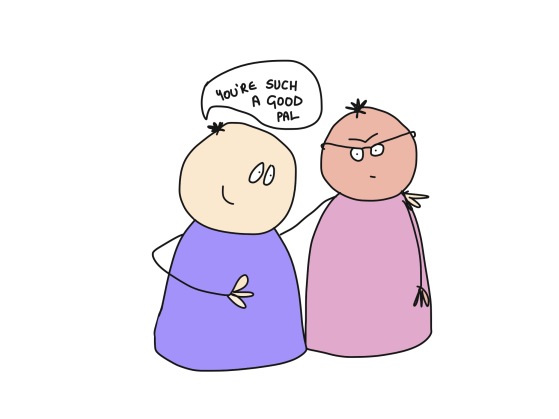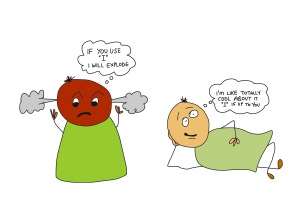Pronouns like I, you, we, and they are always being misused in academic essays. Whilst some pronouns are essential, others must be used with care if you want you to avoid the wrath of the red pen and sarcastic comments in the margin of your marked essay.
I
The use of I in academic writing is always an insanely hot topic amongst those with nothing better to do than argue about pronouns (you’d be surprised how many). Whether it is acceptable in academic writing depends very much on the discipline and context. Science students may as well have ‘I shall not use the first person‘ tattooed onto the inside of their eyelids and have been heard chanting it like a religious mantra. Conversely, many social scientists and humanities students are encouraged to use it when it seems appropriate, in a ‘do as you feel man’ (hippy accent assumed) kind of way.
The truth is: yes, science students should probably avoid it unless they are specifically writing a reflective account of something. Science academics have had it instilled into them that they must always use the passive voice (the liquid was decanted into a test tube) rather than the active one (I decanted the liquid into a test tube) and so it is always best to do what your academics expect. It doesn’t actually matter who is correct here.
Other students have more leeway. It is true that an essay littered with ‘I’s is probably far too full of personal opinion rather than being a sound piece of objective, analytical writing. However, it is sometimes so tortuous to avoid using I that it becomes silly. Referring to yourself as the author or the writer is just a longer way of saying I and doesn’t stop your writing being any more subjective.
It is sometimes suggested that you should be able to use I in the introduction and the conclusion but should avoid it in the main body of the essay. There is some merit to this – in the introduction you are laying out what you are going to cover and in the conclusion, you are summarising your personal arguments. Avoiding it in the main body teaches you to be more analytical and less opinionated.
The golden rule is….if in doubt, check with the person who will be marking it!
You

Using you in an essay comes across as way too informal, like you are just having a cosy chat with the reader. Your tutor is unlikely to appreciate this chummy style. Whilst perfectly acceptable in an informal blog post (phew) it is a no-no in academic writing, which, like it or not, has to use formal English. Instead of using you, consider rewriting the sentence to avoid it altogether or substitute it with one (whilst this may sound pretentious if you say it aloud, it is perfectly acceptable in formal writing and there is no need to avoid it). Please note that one’s is the only possessive pronoun that uses an apostrophe (unlike its for instance, where it’s is ONLY used to mean it is).
We

We is often used by students who are scared to write I. Nobody is fooled by this so please just stop it. In other circumstances, we assumes a knowledge of the reader’s thoughts/feelings that you clearly do not have. Phrases like we are led to believe, or we can now address the issue of... suggest you and the reader are some sort of awesome duo ridding the world of ignorance together. Your tutor will not play this game and you should rephrase to avoid deserved sarcastic comments like “Are we co-writing this essay?”
You may often come across we in academic papers but these will invariably be co-authored and so the use of the we pronoun is perfectly correct.
They
They is not a gender-neutral third person singular pronoun!! (Please say this over and over like the aforementioned religious mantra). They is ALWAYS plural* and should only ever be used when referring to plural nouns. Consider this sentence: Whenever a nurse is concerned that medication is inappropriate, they should seek advice from a superior. Whilst this may sound fine, because we are so used to talking like that, it is grammatically just plain wrong. A nurse is singular, they is plural therefore, this is not correct. You should either use he/she (watch out for a whole other post about the conventions to use there) or pluralise the whole thing: Whenever nurses are concerned that medication is inappropriate, they should seek advice from a superior.
Unfortunately, the English language does not really have a gender-neutral third-person singular pronoun. The best it can offer is one which isn’t always appropriate. You may just need to restructure the sentence to avoid it.
*There is a school of thought that they’s common usage as a gender-neutral third person singular pronoun in spoken English should mean that we accept it as such in our ever-developing written language. Whilst I have some sympathy with this argument, especially when referring to people who do not associate themselves with a particular gender, it has not yet reached the formal world of academic writing. In these cases try to avoid the pronoun altogether and refer to individuals by name or a suitable alias throughout.


